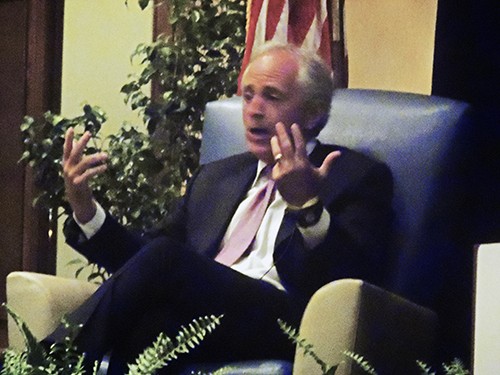 JB
JB
Senator Corker during colloquy with Calvin Anderson at Chamber event
Republican Bob Corker, Tennessee’s junior Senator, is influential enough these days to be talked up as a fallback choice for President and to oversee a 98-1 vote on a bill co-sponsored with New Jersey Democrat Robert Menendez that shifts approval of a nuclear-weaponry deal with Iran away from the sole control of President Obama.
But he didn’t have enough mojo to prevent the Grizzlies from losing Game Six of their second- round NBA playoff series with the Golden State Warriors and thereby ending their season in what Corker had told a Chamber of Commerce luncheon audience at the Hilton would be the first Grizzlies game he’d attended. (And he’d even been pressured to predict a victory for the home team.)
And the fact is, to hear Corker himself telling it, he’s been something of a voice in the wilderness. Despite his power and prestige on the Senate budget and banking committees, and his chairmanship of the Senate Foreign Relations Committee, he sees Congressional attention lagging and performance stalled on a variety of matters he sees as crucial.
As one example, he decried what he saw as “our inability to put our fiscal house in order,” contending that in the 8 ½ years he’s been in Congress, “we haven’t solved a fiscal issue yet.” And, in keeping with his reputation for telling it like it is, Corker said the failure to redress fiscal issues in Washington is the fault of both parties.
Within his own Republican ranks, Corker said, there had developed “a brand of conservatism that’s foreign to me,” one that in effect said, “Spend the same amount of money” as the Democrats, “just don’t pay for it.”
On the vital issue of the nation’s infrastructure, for example, “something we have to have as a nation essential for delivery of goods and services…it looks like we’re going to fumble.” Contrasting national strategies with the “pay-as-you-go” system historically applied to road construction in Tennessee, Corker said Congress was likely to “kick the can down the road” on a highway bill, spending money that doesn’t exist and practicing “generational theft” by creating debt for the future.
And, while “economically, things are picking up,” the Senator lamented that “the mortgage side is still buckled up,” and it was difficult for would-be homeowners to get loans.
On the foreign side, Corker noted several problem areas, including the ongoing confrontation between Russia and Ukraine, the ISIS upsurge in the Middle East, and a stealthy acquisition of previously unclaimed by China, along with a substantial industrial growth that augured for that populous and monolithic nation’s overtaking the United States economically down the road.
Calvin Anderson of Blue Cross/Blue Shield, who served as moderator for a portion of Corker’s presentation, had called attention to the 98-1 victory for Corker’s Iran bill and successfully nudged the audience by saying, “That’s an applause line.”
Corker accepted the plaudits but, in describing the internal negotiations in Congress that led to bipartisan unity on the bill and avoidance of a Presidential veto, made the process seem like a close-run thing. On the principle behind the bill, though, he was firm. It was “Congressionally mandated sanctions” that had crippled Iran’s economy and had “brought them to the table” in the first place, and Congress had a right to approve any deal regarding Iran’s development of nuclear resources.
The Senator expressed optimism regarding the now pending Trade Promotion Authority bill and urged its passage. He reserved judgment on what might happen if the U.S. Supreme Court struck down authority for federally operated state health-care exchanges under the Affordable Care Act.
For all the logjams and procrastination he saw in Washington, Corker said the Senate contained more “talent” than ever before and he downplayed any notion of incivility or friction between Democrats and Republicans. But, he said, there was “an atmosphere of people not having the willingness or the courage to step across the aisle.”
He emphasized his background as a successful self-made business entrepreneur and entertained a bit of nostalgia for his long-gone service as mayor of Chattanooga Mayor, “not as a political guy,” but one, he said, who could “wake up in the morning and throw deep on every play. And fortunately some were caught, and the city oved ahead.”
In a brief availability with reporters after the Chamber luncheon, Corker he had “no way or validating or not validating” charges made by journalist Seymour Hersh alleging that the alleged raid that killed Osama bin Laden in Pakistan was a fiction contrived to veil what had actually been a deal between the United States and Pakistan whereby the Al Quaida chieftain had been in Pakistani custody and was traded for a massive foreign-aid package.
Corker said he’d been in Pakistan several times and characterized the basic U.S. relationship with that country as “transactional one that’s not built on a lot of mutual trust.” But, he said, “it’s an unstable country that has nuclear arms that we need to continue to be engaged with….”
Elaborating further on his concerns about inaction on the U.S. fiscal front, Corker said one problem was a lack of public interest. “It’s on nobody’s mind. Nobody’s. So there’s no pressure. There’s no future for elected officials that want to be reelected to deal with it right now, and I worry that we’ll only deal with it if there’s a crisis down the road.”
During his time in Memphis, Corker made several other stops, including two appearances at Rhodes
College in connection with commencement activities.